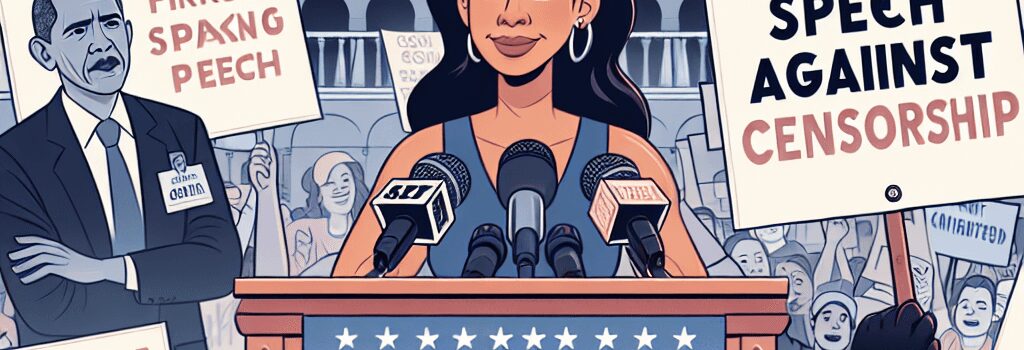Anna Gomez Starts First Amendment Tour Against Censorship by Carr

Campaign of Censorship and Control
Federal Communications Commission (FCC) Commissioner Anna Gomez, the sole remaining Democrat on the five-member commission, announced yesterday a nationwide “First Amendment tour” aimed at drawing attention to what she describes as the Trump administration’s “ongoing campaign of censorship and control” conducted through the FCC under Chairman Brendan Carr. “Since the founding of our country, the First Amendment has protected our fundamental right to speak freely and hold power to account,” Gomez said on April 22, 2025. “Today, the greatest threat to that freedom is coming from our own government.”
Weaponization of Regulatory Authority under Chairman Carr
Commissioner Gomez’s critique centers on a series of high-profile “news distortion” investigations that Carr has launched against major broadcasters. In the past six months, the FCC has:
- Opened an inquiry into CBS News and ABC News, invoking Section 312(a)(7) of the Communications Act (47 U.S.C. § 312(a)(7)) to question editorial decision-making;
- Threatened a similar probe into NBCUniversal, following public comments about its coverage of the 2024 presidential election;
- Revived complaints against national broadcasters that were dismissed during the transition period before President Biden’s inauguration;
- Sent formal letters to technology companies—ranging from social media platforms to fact-checking startups—demanding detailed disclosures of their algorithmic moderation workflows and API usage logs.
According to Gomez’s office, these efforts divert the FCC from its core mandate—“connecting the public, protecting consumers, and supporting competition”—and instead use regulatory tools to silence voices critical of the administration.
First Amendment Tour Details
Gomez has partnered with a broad coalition of consumer groups, civil society organizations, and media law advocates—including the Center for Democracy & Technology (CDT), Common Cause, and the Knight First Amendment Institute—to host a series of open forums and listening sessions. The schedule released by her office includes:
- April 24, 2025: Public keynote at CDT headquarters in Washington, D.C., livestreamed via YouTube and Twitch;
- May 5, 2025: Panel discussion in Chicago on FCC enforcement vs. free speech safeguarding with experts from the Benton Institute for Broadband & Society;
- Mid-June 2025: Tech town hall in San Francisco examining algorithmic transparency requirements for content moderation pipelines;
- Late July 2025: Listening session at the University of Texas School of Law addressing legal recourse under the Administrative Procedure Act (APA).
Regulatory Framework and Legal Challenges
Under the Communications Act of 1934 (as amended), the FCC’s enforcement authority primarily covers technical compliance—such as EAS (Emergency Alert System) equipment, STIR/SHAKEN caller-ID authentication, and spectrum licensing—not newsroom editorial content. Section 312 of the Act governs license renewals and permits the agency to weigh ‘‘public interest’’ considerations, but courts have historically rejected FCC attempts to regulate political or editorial viewpoints. Legal experts predict that the latest “news distortion” rulemaking could face immediate challenges in the D.C. Circuit, where at least three separate lawsuits are already expected to be filed this spring.
Technical Implications for Broadcasters and Platforms
Broadcasters are required to maintain detailed public inspection files under 47 C.F.R. § 73.3526, but the Carr-led inquiries demand deeper metadata tagging of every news segment, including geo-timestamped logs and raw video feeds. Implementing these requirements may require upgrading content management systems (CMS) to support extensible metadata schemas (e.g., IPTC and XMP), revamping CDN configurations, and integrating AI-driven compliance tools. Tech platforms, meanwhile, could face new transparency mandates for machine-learning models—forcing open-sourcing of weights and training datasets, or at minimum, standardized documentation such as Model Cards and FactSheets.
Expert Opinions and Future Outlook
Media law scholars, including Georgetown’s Professor Susan Crawford, have warned that such investigations threaten to chill editorial independence. “Punishing broadcasters for perceived ‘bias’ sets a dangerous precedent—equivalent to asking the IRS to audit newspapers for their political coverage,” Crawford told Ars Technica. Telecom analyst Darren Lieberman at Frost & Sullivan notes that “if the FCC forces platforms to disclose proprietary algorithms, it could undermine investment in AI innovation.”
Looking ahead, Commissioner Gomez is expected to file new rulemaking petitions by early summer challenging the FCC’s statutory authority to pursue content-based complaints. Simultaneously, the agency’s upcoming Notice of Inquiry on AI-enabled content moderation (published May 1, 2025) may intersect with these disputes, as stakeholders debate the technical feasibility and legal basis for imposing ‘algorithmic transparency’ rules on private enterprises.
Conclusion
With Democratic Commissioner Geoffrey Starks set to depart next month, Chairman Carr will command a 2–1 Republican majority on the FCC, intensifying partisan debates over the agency’s role in media oversight. Commissioner Gomez’s First Amendment tour represents a coordinated push by civil society and consumer advocates to reclaim the FCC’s regulatory focus—from policing editorial decisions back to its traditional bedrock functions of spectrum management, network reliability, and competitive access.
Further Reading and Upcoming Dockets
- FCC Notice of Inquiry on AI Transparency (GN Docket No. 25-XX)
- Benton Institute Comments on News Distortion Enforcement (April 2025)
- Georgetown Law Advanced Media Projects on Free Speech Jurisprudence